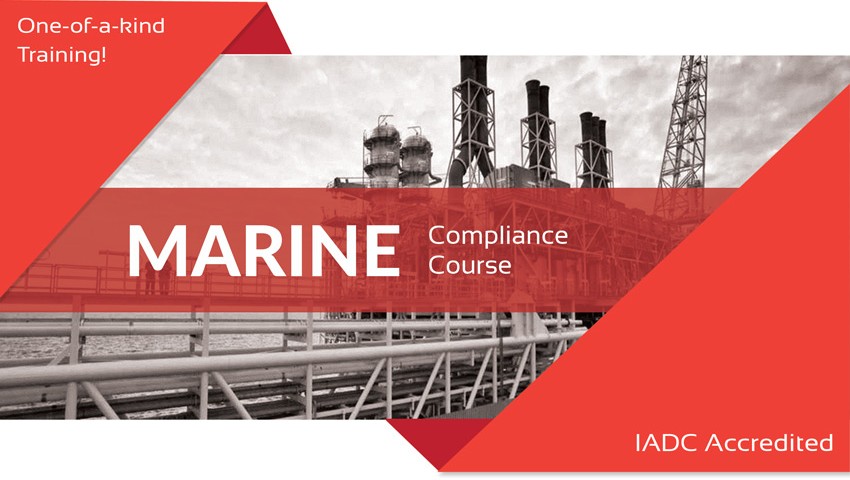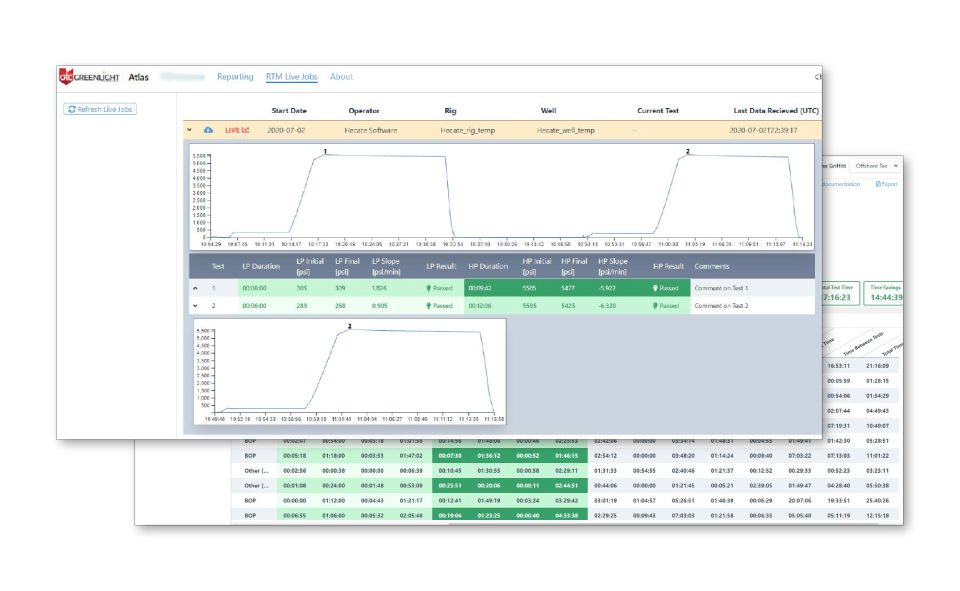- Have any questions?
- +985-727-7400
OTC’s Marine Regulatory Compliance Training Q&A

New Well Control Changes Mean New Opportunities
September 16, 2016
‘Good Initiative, Bad Judgment’
September 29, 2016
OTC’s Marine Regulatory Compliance training is a three-day (24-hour) course accredited by IADC. This course is intended for all personnel pursuing knowledge in Marine Regulatory Compliance for oil and gas vessels, MODU and FPSO’s and Floating Production Facilities operating in the GOM and internationally.
Learn more about this course and register.
MEET THE INSTRUCTORS
 Michael W. Bacher is a Senior Marine Inspector with Offshore Technical Compliance. His experience includes USCG Inspections, Marine Integrity Reviews, Commissioning and Acceptance Inspections. He served as Master and offshore Installation Manager for both Seadrill and Transocean on Drillships West Auriga and GSF Explorer. In that role, he was directly responsible for all aspects of vessel management, rig QHSE, repair and maintenance, budget and payroll, regulatory compliance and management of 200 crews during deepwater drilling operations. In addition to being a Senior Marine Inspector for OTC, he continues to actively sail as Master for Military Sealift Command contract vessels, consults with American Bureau of Shipping and is the Unlimited Master for InterMoor.
Michael W. Bacher is a Senior Marine Inspector with Offshore Technical Compliance. His experience includes USCG Inspections, Marine Integrity Reviews, Commissioning and Acceptance Inspections. He served as Master and offshore Installation Manager for both Seadrill and Transocean on Drillships West Auriga and GSF Explorer. In that role, he was directly responsible for all aspects of vessel management, rig QHSE, repair and maintenance, budget and payroll, regulatory compliance and management of 200 crews during deepwater drilling operations. In addition to being a Senior Marine Inspector for OTC, he continues to actively sail as Master for Military Sealift Command contract vessels, consults with American Bureau of Shipping and is the Unlimited Master for InterMoor.
Jodee Jones is a Senior Marine Inspector with Offshore Technical Compliance. She joined the OTC team after serving nine years on active duty as a Lieutenant in the US Coast Guard. Her last tour of duty was as the Assistant Chief, Outer Continental Shelf Division in Morgan City, Louisiana. In that role, she coordinated and led regulatory and safety inspection teams on drilling and production platforms to ensure compliance with all applicable safety, security and environmental laws and regulations on 150+ inspections annually.
Q&A ON THE COURSE
1. Who should take this course?
Michael: Non-mariners such as Drilling OEMs and others will find this course particularly valuable. It is designed to provide a well-rounded, overall understanding of marine regulatory compliance. Additionally, for those who are up-and-coming managers and marine managers, and rising marine officers on drilling vessels, the course assists with competency in marine compliance and problem solving, which will be essential in their future career path.
2. If I’m not specifically in a marine position, should I still consider this course?
Michael: Offshore and shoreside managers who have regulatory compliance responsibilities and don’t come from a marine background will benefit the most from this course.
Jodee: Yes! Anyone with regulatory responsibilities offshore, or anyone who may be coming into a marine position in the future, will benefit from the course. We cover the basics from which assets get inspected to the details of how actual inspections are conducted.
3. Why is marine regulatory compliance so important in the oil and gas industry?
Michael: Ultimately every rig at sea sits on a vessel, and under the regulations, vessels are subject to marine compliance. Marine compliance focuses on safety of personnel, protection of the environment and ensuring the structural integrity of the rig, safety equipment and maintenance of all operating systems. The key to successful regulatory compliance is ensuring that managers understand their roles in continual improvement of their rigs, while at the same time, regulations become more robust as a response to large-scale events such as have been recently witnessed.
Jodee: With the past incidents that have occurred in the Gulf of Mexico, the oil and gas industry has been under scrutiny to ensure not only the safety of offshore workers but the environment as well. This means regulations have become, and will continue to be more stringent to prevent future incidents. Regulatory compliance creates a standard for all oil and gas organizations to follow to provide the safest offshore working environments possible. Understanding the regulations is imperative to make sure all of the standards are being followed and that offshore assets are in compliance.
4. Why is this marine regulatory training essential?
Michael: Much of the success of implementing compliance and regulatory compliance is knowing where to look for answers to regulatory questions. This course does a particularly good job at not only explaining why regulations exist and where the regulations come from, but also digging into the regulations to find answers to particular challenges. At OTC, we have a saying that regulatory compliance is good business. This philosophy can be extended to companies and their assets to ensure fiscal responsibility from both a lifecycle perspective in the long term, but prevention of the high cost of correcting deficiencies in the short term.
Jodee: When offshore personnel have a better understanding of where the regulations come from, what will be inspected and how it will be inspected, they can better prepare their own facilities for regulatory visits. This can help reduce the number of deficiencies or INCs issued by regulatory agencies, saving companies time and money while also maintaining a safe work environment offshore.
5. What can participants expect to gain from this course?
Michael: The overall objective of the course is to provide participants with a high level and clear understanding of marine regulatory compliance for the oil and gas industry, as well as knowledge of compliance requirements and inspection methodology.
6. This course is not required under any regulatory standards, so why should oil and gas personnel spend the time to take the course?
Michael: Although this course does not fulfill a STCW certification requirement, forward-thinking companies focus on regulatory compliance training because of a material realization of cost savings through prevention. Safety and marine regulatory compliance go hand-in-hand and are definitely recommended in the oil and gas sector.
7. Is the course more focused on a specific arena such as deepwater operations versus the Gulf of Mexico shelf or working on a production platform versus a drillship?
Michael: Marine compliance is an international requirement that transcends U.S. territorial waters; however, the course also focuses on specific requirements under the Code of Federal Regulations (CFR), some of which are unique to U.S operations.
Jodee: The course has been designed to cover the basics in all aspects of marine regulatory compliance – from platforms to drillships, deepwater and shelf. Regulations, however, are more extensive when it comes to drillships and deepwater operations, but the instructors are experienced in all aspects and cover the basics in each area.
8. Are current trends in the industry and real-word situations covered in the course?
Michael: The entire implementation of regulations is derived from cause and effect of real-world disasters going back to the sinking of the Titanic. Major disasters lead to new regulations, and we can expect future revisions to regulations, for example, through the Macondo incident and the Costa Concordia incident.
Jodee: Throughout the course, students will hear case studies and real-life situations experienced by the instructors, and have the opportunity to provide their own input and ask questions about real-world scenarios they have experienced.
9. What is different about this training than other Marine Regulatory Compliance training offerings?
Michael: The lead instructors of the course come from unique backgrounds and perspectives in marine compliance. While Jodee contributes significantly from her extensive background, education and experience in marine inspections, I have the history of being subject to numerous inspections on a wide variety of vessel types through my career and have learned the fine art of preparing crews and vessels for inspection. The most successful vessels are those that follow the regulations at all times so that preparation is not necessary, and that has been my goal as Master and Installation Manager of ships and rigs.
Jodee: The instructors have a unique background, myself being a Coast Guard regulatory inspector on oil and gas facilities for several years. I have personal experience to know how the inspection process operates and what inspectors are really looking for when they’re onboard, so I can bring a different perspective to the table. Additionally, our course helps students get a feel for what they can do to better prepare their own facilities for inspection. They’ll not only get a feel for what is looked at, but how to understand and apply the actual regulations.
10. Some personnel have been working offshore for a few years and have never taken a marine regulatory compliance course. Should they consider this course?
Michael: By the time they get to the level of Chief Mates and Masters with upwards of 10 to 20 years of experience, a lot of what is reviewed in the course will be common knowledge for them; however, leaders of rigs and shoreside marine compliance coming from outside the marine side, such as a drilling manager or superintendent, will find this course the most beneficial. The offshore oil and gas industry is filled with managers who have little or no marine background but are expected to be experts in marine compliance because marine vessels are the underpinning of their rigs.
11. How up to date is the information provided in the course, and is marine compliance ever-changing?
Michael: Marine regulations change slowly in response to new disasters or evolving concepts of safety. The course is new and current to existing regulations so that students will have a clear and accurate understanding of existing marine regulations and the codes from which they are derived. OTC ensures all subject matter is current and in compliance with our IADC-accredited mandated reviews. As regulatory issues change, the course will be updated through annual course audits and other continual improvement opportunities. Updates in CFR or other regulatory manuals drive a requirement to review and update the course.
Jodee: Marine regulation changes are typically a slow process; however, they do on occasion change. We have scheduled IADC reviews for our course, so in the event changes are made, we will update our course materials as needed. Additionally, regulatory agencies occasionally put out notices to keep the industry abreast of any ongoing issues or major findings. We keep up to date on these things as well and will incorporate them into the course as needed.
12. What unique experience/perspective do you bring to Offshore Technical Compliance’s Marine Regulatory Compliance course?
Michael: I’ve worked with contractors, marine safety personnel, drilling operations and managed vessels through countless marine compliance audits. Additionally, as an International Safety Management (ISM) and International Ship and Port Security (ISPS) auditor, I’ve conducted many marine reviews and audits. As a certified incident investigator, I understand the continual improvement process and can draw on root-cause analysis for meaningful corrective actions. For students in the marine course, I’m able to share practical insights in ensuring that their vessels maintain a high state of readiness to compliance so that they are always prepared for audits.
Jodee: I’ve been the regulatory official that actually conducted inspections for the US Coast Guard! I personally conducted the inspections, issued deficiencies for findings observed onboard hundreds of vessels and facilities and issued and signed off on Certificates of Inspection and Certificates of Compliance (the documents all assets need to operate offshore). I understand how the regulations work, where they come from and how they are enforced and interpreted. I can provide input and share my experience from being in the “boots-on-deck” position. Additionally, as the Assistant Chief, OCS Division, I led and trained the inspection teams and was also responsible for plan reviews, including Fire Control Plans, Emergency Evacuation Plans, Operations Manuals, etc. If I don’t have answers to questions, I know where to go to find them!
13. What changes do you foresee for this course in the future?
Michael: Down the road, if changes are put into place due to the Macondo well disaster or as marine pollution standards changes, the course will be updated to reflect those changes. Otherwise, many other aspects of marine compliance such as fire safety standards or construction requirements are static and not apt to change significantly.
Jodee: Marine regulations are often slow to change, but if and when they do, we will be sure to make any necessary corrections to this course. We will also be sure to keep up with any recommendations or guidance provided by regulatory agencies to make sure we are providing the most current information.

